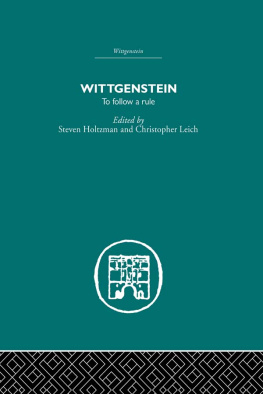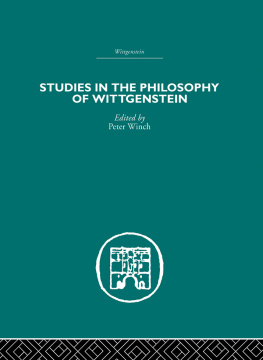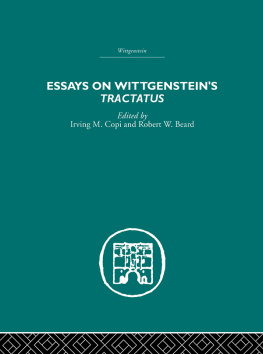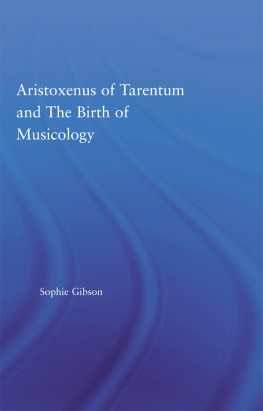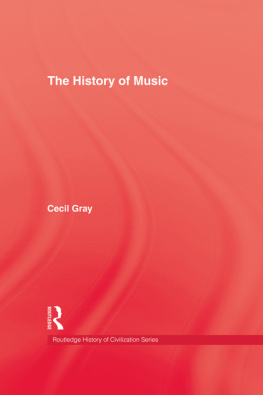WITTGENSTEIN:
TO FOLLOW A RULE
WITTGENSTEIN
ROUTLEDGE LIBRARY EDITIONS
WITTGENSTEIN
| 1 | Essays on Wittgenstein's Tractatus | Edited by Irving M. Copi and Robert W Beard |
| 2 | Marx and Wittgenstein: Social praxis and social explanation | D. Rubinstein |
| 3 | Studies in the Philosophy of Wittgenstein | Edited by Peter Winch |
| 4 | Wittgenstein: To follow a rule | Edited by Steven Holtzman and Christopher Leich |
| 5 | Wittgenstein: A critique | J.N. Findlay |
| 6 | Wittgenstein and Modern Philosophy | Justus Hartnack |
| 7 | Wittgenstein's Philosophy of Language: Some aspects of its development | James Bogen |
| 8 | Wittgenstein and the Turning-Point in the Philosophy of Mathematics | S.G. Shanker |
WITTGENSTEIN
To follow a rule
Edited by
Steven Holtzman and Christopher Leich
First published 1981
This edition first published 2006 by
by Routledge
2 Park Square, Milton Park, Abingdon, Oxon, OX14 4RN
Routledge is an imprint of Taylor & Francis Group
Transferred to Digital Printing 2007
1981 Steven H. Holtzman and Christopher M. Leich
All rights reserved. No part of this book may be reprinted or reproduced or utilized in any form or by any electronic, mechanical, or other means, now known or hereafter invented, including photocopying and recording, or in any information storage or retrieval system, without permission in writing from the publishers.
The publishers have made every effort to contact authors and copyright holders of the works reprinted in the Wittgenstein series. This has not been possible in every case, however, and we would welcome correspondence from those individuals or organisations we have been unable to trace.
These reprints are taken from original copies of each book. In many cases the condition of these originals is not perfect. The publisher has gone to great lengths to ensure the quality of these reprints, but wishes to point out that certain characteristics of the original copies will, of necessity, be apparent in reprints thereof.
British Lihrary Cataloguing in Publication Data
A CIP catalogue record for this book
is available from the British Library
Wittgenstein
ISBN 0-415-38282-3 (volume)
ISBN 0-415-38278-5 (set)
Routledge Library Editions: Wittgenstein
Wittgenstein:
to Follow a Rule
International Library of Philosophy
Editor: Ted Honderich
A catalogue of books already published in the
International Library of Philosophy
will be found at the end of this volume
Wittgenstein:
to Follow a Rule
Edited by
Steven H. Holtzman
and
Christopher M. Leich
First published 1981
2 Park Square, Milton Park, Abingdon, Oxon, OX14 4RN
270 Madison Ave, New York NY 10016
Set in 10/12 pt Times by Input Typesetting Ltd, London
Introductory Essay and editorial matter
Copyright Steven H. Holtzman and
Christopher M. Leich 1981
Text Routledge 1981
No part of this book may be reproduced in
any form without permission from the
publisher, except for the quotation of brief
passages in criticism
British Library Cataloguing in Publication Data
Wittgenstein: to follow a rule.
(International library of philosophy)
I. Holtzman, Steven H.
II. Leich, Christopher M.
192 B3376.W564 80-42299
ISBN 0-7100-0760-4
To the memory of Gareth Evans
CONTENTS
Christopher M. Leich and Steven H. Holtzman
Gordon Baker
Christopher Peacocke
Crispin Wright
Gareth Evans
John McDowell
Simon Blackburn
Charles Taylor
Philip Pettit
Gordon Baker is a Fellow of St John's College, Oxford.
Christopher Peacocke is a Fellow of New College, Oxford.
Crispin Wright is Professor of Logic and Metaphysics in the University of St Andrews.
Gareth Evans was Wilde Reader in Mental Philosophy in the University of Oxford, and a Fellow of University College.
John McDowell is a Fellow of University College, Oxford.
Simon Blackburn is a Fellow of Pembroke College, Oxford.
Charles Taylor is Chichele Professor of Social and Political Theory in the University of Oxford, and a Fellow of All Souls College.
Philip Pettit is Professor of Philosophy in the University of Bradford.
Steven H. Holtzman (ed.) is a Graduate Student at Corpus Christi College, Oxford.
Christopher M. Leich (ed.) is an Assistant Professor of Philosophy at Georgetown University.
Unless otherwise indicated, all references are to Ludwig Wittgenstein, Philosophical Investigations, Blackwell, Oxford, 1953. References to Part I are by section number, and to Part II by page number.
The following abbreviations are used in references to other works by Wittgenstein:
| BB | The Blue and Brown Books, Blackwell, Oxford, 1958. Followed by page number. |
| BT | Big Typescript, Manuscript no. 213 in von Wright catalogue. |
| LFM | Lectures on the Foundations of Mathematics, Harvester Press, Hassocks, 1976. Followed by page number. |
| OC | On Certainty, Blackwell, Oxford, 1969. Followed by paragraph number. |
| PG | Philosophical Grammar, Blackwell, Oxford, 1975. Followed by page number. |
| PR | Philosophical Remarks, Blackwell, Oxford, 1975. Followed by page number. |
| RFM | Remarks on the Foundations of Mathematics, revised 3rd edition, Blackwell, Oxford, 1978. Followed by part and section numbers. |
| WWK | Ludwig Wittgenstein and der Wiener Kreis, shorthand notes of F. Waismann, McGuinness (ed.), Blackwell, Oxford, 1967. Followed by page number. |
| Z | Zettel, Blackwell, Oxford, 1967. Followed by section number. |
The abbreviation PLP stands for F. Waismann, The Principles of Linguistic Philosophy, R. Harre (ed.), Macmillan, London, 1965. Followed by page number.
The essays and replies in this volume represent, with some modifications, the proceedings of a colloquium held in Oxford in Trinity Term, 1979. A few points concerning the goals of and participants in this colloquium deserve explanation at the outset.
With occasional notable exceptions, critical response to the Philosophical Investigations in the two decades following its publication tended to focus on a fairly limited range of topics, suggested by certain especially striking series of remarks of Wittgenstein's e.g. the idea of family resemblance, the conception of philosophy as therapy, the private language argument and so on and to treat these topics piecemeal, in isolation from one another. An apparently unsystematic book was discussed in a genuinely unsystematic fashion; even the remarks about the connection between meaning and use that Wittgenstein wove into nearly every corner of Part I of the

